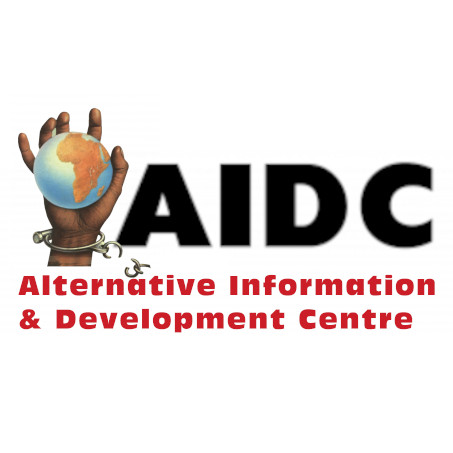AIDC Alternative Information & Development Centre
The Global South Project on Combating IFFs and BEPS, the Churches and Mining network, Asian Peoples’ Movement on Debt and Development, and the Alternative Information & Development Centre will be hosting a Global School on Combating Illicit Financial Flows, Profit Shifting, Tax and Wage Evasion. The Global School will take place between 5 – 8 September.
In the face of a post-Covid economic slump and runaway inequality, even proponents of austerity and economic liberalisation like the IMF are now calling into question the vast outflow of capital from the Global South known as illicit financial flows and base erosion profit shifting (IFFs and BEPS). The rise of IFFs and BEPS has had a disproportionately negative effect on countries in the Global South; both as a result of the disproportionate reliance on corporate income tax as a percentage of total revenue in global South countries, as well as the magnitude of resources required to address historical economic injustices. Many of these countries are heavily indebted at a time when raising more revenue for development is needed more than ever, especially when responding to the economic and social crises triggered by the COVID-19 pandemic.
Not unrelated to the problem of IFF and BEPS, many countries in the Global south have unwaveringly stuck with political-economic growth paths which have left their economies – and by extension their fiscus – reliant on large transnational corporations operating mainly in the extractives sector. Within this context, the haemorrhaging of finances resulting from IFFs and BEPS has resulted in a draining of tax revenues, a worsening of debt, growing inequalities and a lack of adequate public spending.
It is therefore crucial that both domestic and international tax systems be understood and interrogated; that pressure be placed on governments to shape these tax and economic systems into more progressive forms, capable of mobilising our own resources for the sake of people and the planet. Trade regimes that encourage or create vulnerabilities to increasingly unregulated capital flows must be challenged in order to lay the basis for meaningful alternatives to development.
Civil society organisations from around the world have made massive contributions towards our understanding of IFFs/BEPS in recent years, and continue to put pressure on governments and international bodies to act. However, there has been relatively little work done in order to make this information accessible, or to find means of resistance at a case by case or company by company level.
This is important, because IFFs and BEPS are not just tax issues that can be left for policymakers and tax experts alone. Although taxation receives the most attention, other obligations avoided by TNCs include the payment of meaningful wages and the fulfilment of community development plans or environmental rehabilitation contracts. The lives of people living and working in and around the subsidiaries of TNCs continue to be affected in serious ways through these practises: Profit shifting deprives local subsidiaries of resources for improvements in wages and working conditions (wage evasion), which ‘legitimise’ the payment of low-wages in source countries, driving wage inequalities. Profit shifting also allows these subsidiaries to avoid their obligations to community development and environmental rehabilitation, especially in the case of extractive industries. In the end, it is workers, communities, and those reliant on quality public services who lose the most, and so it is vital that they be capacitated to understand and resist these outflows from a grassroots level.
Illicit financial flows and base erosion profit shifting have been called the ‘Achilles’ Heel’ of transnational corporations, because they present a vulnerability through which the architecture of corporate impunity can be tackled. Through both the interrogation of the tax and economic frameworks governing our economies, as well as the pursuit of grassroots-based action, we can begin to reclaim some of the wealth that is plundered by multi- and trans-national corporations operating in the Global South.
Profit shifting is a phenomenon that sits at the nexus of a number of popular struggles; including those of the anti-austerity, anti-extractivist, environmentalist, and labour movements. When the issue of IFFs and BEPS is brought to these struggles, concretized and made relevant to them, then it retains its political potential to help build an understanding of modern political economy and assist in enabling these movements to meet their vital demands.
The Global School aims to be an extension of existing national level processes, using them as a basis to create a space for international solidarity and mutual learning between members of popular movements concerned with economic, social and environmental justice. IFFs and BEPS are problems with many facets, and it is therefore vital that different groups be brought together in order to have a truly transformative conversation.
The Global South School will bring together workers, activists, and community based organizations from across the Global South for four days of learning and coalition building centered on these questions.
To join register here: https://4t10.short.gy/NX2AQ5
The post Global School on Combating Illicit Financial Flows, Profit Shifting, Tax and Wage Evasion appeared first on AIDC






